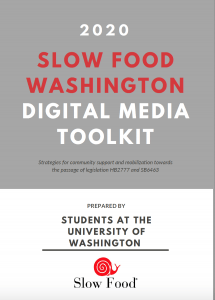During this quarter, I had the opportunity to work with my group in aiding Slow Food Washington in raising awareness and support among the chapters in Washington for House Bill 2777 and Senate Bill 6463. If passed, the bills would regulate the use of micro-enterprise kitchens and permit the sale of food made in one’s home. This can provide a stream of income for those affected by the turbulent job market due to COVID-19, and empower individuals who are interested in starting a restaurant but lack the capital to do so. Through the experience, my group has learned about community mobilization and the importance of storytelling. We also learned about legislation advocacy strategies that aided in a similar bill in California gaining support and becoming law. My group specifically developed a Digital Media Strategy Toolkit that is able to be customized by the specific chapters. Through our project, we have been able to apply the theory to practice, and empower people through tangible acts of advocacy.
This course has truly exemplified how important systemic thinking is, and is something that I will seek to bring into other subject areas. In the very beginning of the course, we discussed the pitfalls of Michael Pollen’s argument made from a privileged perspective, and the dangers of reductionism. To consider an issue by breaking it down and focusing on individual aspects is incredibly limiting. To fully digest connections and reveal the deeper “why” and historical context, it is critical to use systemic thinking. This time in history has been an unveiling to the injustices of our systems. For example, undocumented farm workers that are deemed essential are forgotten, as seen in the So Close to America documentary. The workers are the backbone of our food system yet are not given the protections needed. In addition, this is a time of great unrest and pain and is an opportunity for significant systemic change, which can bring forward sustainable change that will benefit disenfranchised groups.




